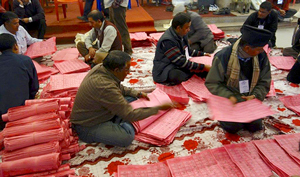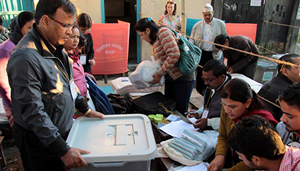Nepal's second Constituent Assembly elections were held on 19 November 2013, with strong support from the Australian Government. The new Assembly will write a long-delayed Constitution for Nepal.
The Australian Government provided observers and experts as well as funding for Nepal's Electoral Educational Information Centre.
Australian senators Helen Kroger and Ursula Stephens officially observed the elections. Along with other international observers, they declared the election was well conducted with a high turnout, estimated at more than 70 per cent.
Australia also funded the construction of Nepal's Electoral Educational Information Centre. Its operation is supported through a partnership with the Australian Electoral Commission. Around 12,000 people have visited the Centre's electoral education program since it opened in May 2012.
The Centre's team was responsible for all training, voter education and media management for the 2013 election. It was also used to conduct the training of 'master trainers'–the first step in training more than 214,000 election staff and 20,000 staff involved in delivering the voter education program.
Australia further supported the Centre with the deployment of three Australian Youth Ambassadors for Development. One of these volunteers worked with the Commission to pilot the use of social media during the election to better target youth voters.
Australian funding provided the Commission with two advisers from the Australian Civilian Corps. William Hogan and Silvana Puizina worked with the United Nations Development Fund's Election Support Program to help the Election Commission to implement a voter education strategy and train local officials to prepare and manage the election process.
William said it was challenging to plan, prepare and manage an election in a country with more than 100 ethnic groups and 92 languages, dispersed over many areas of mountainous terrain.
'A number of elements come into play, including security arrangements, material preparation, voter education training and delivery, polling training programs and management of human resources,' he said.
'We worked closely with district electoral officers to manage these issues and this gave us a good understanding of the realities and constraints faced on the ground.'
'For two months we provided on-the-ground support to regional and district officers to plan and prepare for the elections,' Silvana said. 'In the process we have helped build the confidence of electoral officers in Nepal to manage an election process, and this is our key achievement.'
Post-elections, Silvana and William will help the Election Commission plan
and prepare for local government elections in April 2014, applying the lessons
learnt from this election round.


